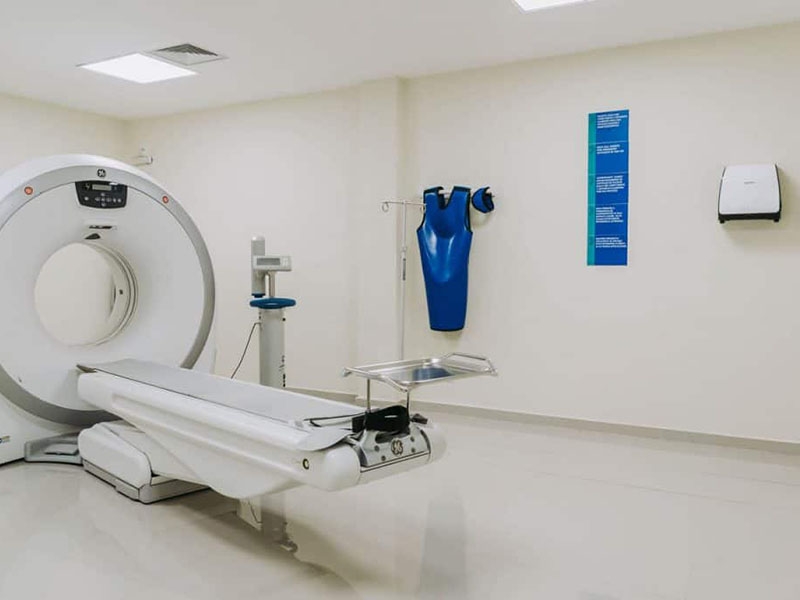
Computed tomography
Watch our video about Computed tomography
What is Computed Tomography?
Computed Tomography (CT) is an advanced diagnostic imaging technique that uses X-rays and computer technology to create detailed cross-sectional images of the body. It provides a more comprehensive view of internal structures than traditional X-rays, allowing healthcare professionals to visualise bones, organs, blood vessels, and soft tissues with high precision.
At Clinic Consultation, our state-of-the-art CT scanners deliver fast and accurate results, making it a vital tool for diagnosing a wide range of medical conditions and planning treatments. The procedure is non-invasive and highly effective in providing detailed insights into the body's internal workings.
What is Computed Tomography Used For?
CT scans are used for both diagnostic and monitoring purposes. They help detect injuries, diseases, and abnormalities that may not be visible through other imaging methods. CT scans are frequently employed to diagnose trauma, identify tumours, detect infections, and assess vascular diseases.
Beyond diagnosis, CT scans are used to guide medical procedures, such as biopsies, and monitor the effectiveness of ongoing treatments. At Clinic Consultation, CT scans are tailored to meet individual diagnostic needs, ensuring precise and personalised care.
How Does Computed Tomography Work?
During a CT scan, the patient lies on a motorised table that slides into a doughnut-shaped scanner. The machine uses rotating X-ray beams to capture multiple images from different angles. These images are then processed by a computer to create detailed cross-sectional views of the body.
Some CT scans may require the use of a contrast dye, which enhances the visibility of certain structures. The dye can be administered orally, intravenously, or rectally, depending on the area being examined. The procedure is quick, typically taking 10-30 minutes, and is conducted with minimal discomfort.
What Are the Types of Computed Tomography?
There are several types of CT scans designed for specific diagnostic purposes:
Head CT Scan
Focuses on the brain, skull, and sinuses. It is used to diagnose conditions such as strokes, tumours, or traumatic brain injuries.Chest CT Scan
Provides detailed images of the lungs, heart, and chest cavity. It is commonly used to detect lung diseases, pulmonary embolisms, or tumours.Abdominal and Pelvic CT Scan
Examines organs like the liver, kidneys, pancreas, and reproductive system. It is useful for identifying tumours, infections, or kidney stones.Angiography CT (CTA)
Visualises blood vessels and assesses vascular diseases, such as aneurysms, blockages, or arterial diseases.Spinal CT Scan
Evaluates the spine and surrounding tissues, helping to diagnose herniated discs, fractures, or spinal cord injuries.Bone CT Scan
Used to detect fractures, osteoporosis, or bone infections. It provides highly detailed imaging of the skeletal system.Cardiac CT Scan
Focuses on the heart to evaluate coronary artery disease, heart structure, or other cardiac conditions.
Each type of CT scan is performed using advanced techniques to ensure accurate and detailed results at Clinic Consultation.
What Conditions Can Be Detected Through Computed Tomography?
CT scans are effective in diagnosing a variety of conditions, including:
Traumatic Injuries
Detects fractures, internal bleeding, or organ damage.Brain Tumours and Stroke
Identifies abnormal growths or reduced blood flow to the brain.Lung Diseases
Diagnoses conditions like pneumonia, pulmonary embolism, or lung cancer.Abdominal Disorders
Evaluates appendicitis, kidney stones, or liver disease.Heart Conditions
Detects coronary artery disease, aneurysms, or heart abnormalities.Cancers
Identifies and stages various types of cancers, including tumours in the brain, lungs, and abdomen.Vascular Disorders
Assesses blood vessel blockages, aneurysms, or other vascular conditions.
When is Computed Tomography Indicated?
CT scans are recommended in several situations:
Suspected Stroke or Brain Injury
To evaluate neurological symptoms or trauma.Chest Pain or Breathing Difficulties
To detect lung infections, pulmonary embolisms, or heart conditions.Abdominal Pain
For diagnosing appendicitis, kidney stones, or other abdominal conditions.Trauma Cases
To quickly assess internal injuries or fractures.Cancer Diagnosis or Monitoring
For identifying tumours and monitoring treatment progress.Vascular Issues
To evaluate blood flow and detect aneurysms or arterial blockages.Pre-Surgical Planning
To provide detailed imaging for guiding surgical procedures.
Pre- and Post-CT Scan Care
Before the Procedure:
- Inform your doctor of any allergies, particularly to contrast dyes.
- Follow fasting instructions if contrast dye will be used.
- Remove all metal objects, including jewellery or belts, as they may interfere with imaging.
After the Procedure:
- Drink plenty of water to flush out any contrast dye.
- Resume normal activities unless otherwise advised by your doctor.
- Discuss the results with your doctor to understand the findings and next steps.
What Are the Contraindications for Computed Tomography?
While CT scans are generally safe, certain conditions may require caution:
- Pregnancy: Radiation exposure may pose risks to the developing foetus.
- Allergy to Contrast Dye: Patients allergic to iodine-based dyes may need alternative imaging options.
- Severe Kidney Disease: Contrast dye can sometimes affect kidney function.
- Claustrophobia: Open or low-dose CT options may be available.
At Clinic Consultation, we carefully evaluate each patient’s medical history to ensure safety and effectiveness.
What Are the Alternatives to Computed Tomography?
For patients unable to undergo a CT scan, alternative imaging techniques include:
- MRI: Provides detailed images without using radiation.
- Ultrasound: Effective for soft tissue and organ imaging.
- X-ray: Useful for basic bone and joint imaging.
- PET Scan: Combines imaging and metabolic analysis to detect abnormalities.
Our team at Clinic Consultation works closely with patients to determine the most suitable diagnostic approach.
Book Your CT Scan at Clinic Consultation
Computed Tomography is an essential diagnostic tool for evaluating and managing a wide range of medical conditions. At Clinic Consultation, we combine advanced technology with patient-focused care to ensure accurate results and a comfortable experience. Schedule your CT scan online today and take a proactive step towards better health.
Click here to schedule an appointment online